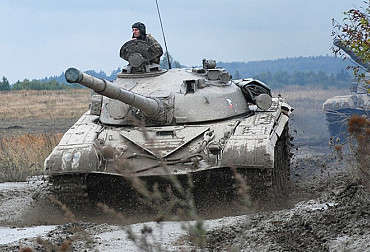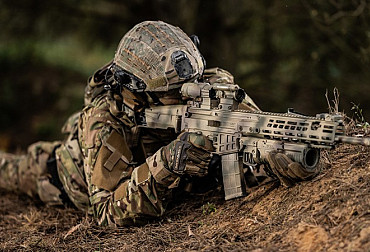2% of GDP on defence is an ambitious plan, but it is realistic, Jana Černochová says
Talks between the proposed ministers of the new Government of Petr Fiala and President Miloš Zeman should end at the end of this week. Among those who have already attended this meeting is the candidate for the post of Minister of Defence, MP Jana Černochová (ODS). In her case, it is actually a continuation of her ten-year work in the Defence Committee of the Chamber of Deputies. We therefore asked her about her ideas on taking over the management of the ministry from her predecessor Lubomír Metnar. For a change, there is speculation that he will move to the Defence Committee and become its chairman after his tenure in the government-in-demise as a deputy from the ANO movement. Indeed, he himself made no secret of his wish to continue his parliamentary work for the ministry at the Commanders' Meeting of the Czech Armed Forces, which took place in November this year.

Picture: Jana Černochová | archive of Jana Černochová
Madam Deputy Speaker, in the last parliamentary term, as Chair of the Defence Committee, you fought for the Army and supported modernisation processes. Will you be able to build on this work in your ministerial capacity?
Absolutely. My more than a decade of service on the Defence Committee, both as a member and as Chair, was undoubtedly good preparation. I dare say that I know the Defence Ministry and the Army well, I know how they work, even though I have been more of an outside observer. Of course, having ministerial responsibility is something else. If I become a minister, I have something to build on and I have the experience for the role. Nevertheless, I will approach this new role, if it arises, with great humility and respect.
As Minister, you will take over the pending tenders, including the largest tender for tracked IFV. What will be your next steps?
I am not a minister, so in general, the aforementioned tender for the acquisition of new IFVs has reached an impasse. As chairman of the Defence Committee, I repeatedly warned that the process would not be easy and that the planned timetable was too optimistic. A solution to the situation has yet to be found, and I do not want to prejudge anything until I have a detailed understanding of the status of the contract and the options for moving forward.
In your opinion, does the Ministry need to revise the acquisition and modernisation plans of the Army, or modify the Concept of Build-up of the Army?
The Army Build-up Concept is a good strategy, but the problem is that its implementation is lagging. Just mention the Infantry Fighting Vehicles or the slow growth in defence spending. So we have two options, either to implement the concept and catch up with the slippage of some things or to rethink it. I want the army to have what it needs to fulfil its missions and our allied commitments. That is why we need to reach 2% of GDP, which is what our incoming Government plans to do by 2025. And that's also why we need to accelerate and streamline the acquisition process.
In the House of Commons, it has never happened in our modern history that a minister of the previous Government has sat as a member of the same committee in a subsequent term. In your view, will the collaboration work?
I believe it will, whether I am a Minister or not. We have a good relationship with Minister Metnar, our cooperation has always been fair and I supported the Minister's nomination to this position in our parliamentary club. I have long held the view that the defence and security of the country should be an area where there is no fierce political battle. Minister Metnar and I have long been pursuing this and I believe that we will continue to do so.
Under your leadership, the Defence Committee has been heavily involved in the defence agenda, and you know and know what Members want to know. As Minister, do you plan to change the way the Ministry communicates with the House?
I dare say that over the past four years we have managed to establish a fairly intensive level of communication and information between the Ministry of Defence and the Defence Committee. If we, as Members, felt that we were lacking information, we were able to speak up, and the Ministry's leadership has learned to communicate crucial matters to us in advance. As an MP, I am well aware that keeping MPs informed is crucial to their scrutiny role, but it also helps good relationships and support for MOD policy. I believe that it is also because Minister Metnar and I know each other well that this can work.
The coalition has set as one of its priorities to achieve defence spending of 2% of GDP by 2025. Do you still see this as a realistic deadline?
Yes, it is an ambitious target, but it is realistic. It means an annual increase in the defence budget of approximately between CZK 10 billion and CZK 12 billion, depending on the development of the economy. This will be generated both by savings on the revenue side of the state budget, for example by abolishing subsidies on fares, etc., but also by natural economic growth, which is often forgotten. Just as important as the size of the budget is its stability and predictability. That is why we will propose legislation that will allow for multiannual and predictable financing of military investments.





















